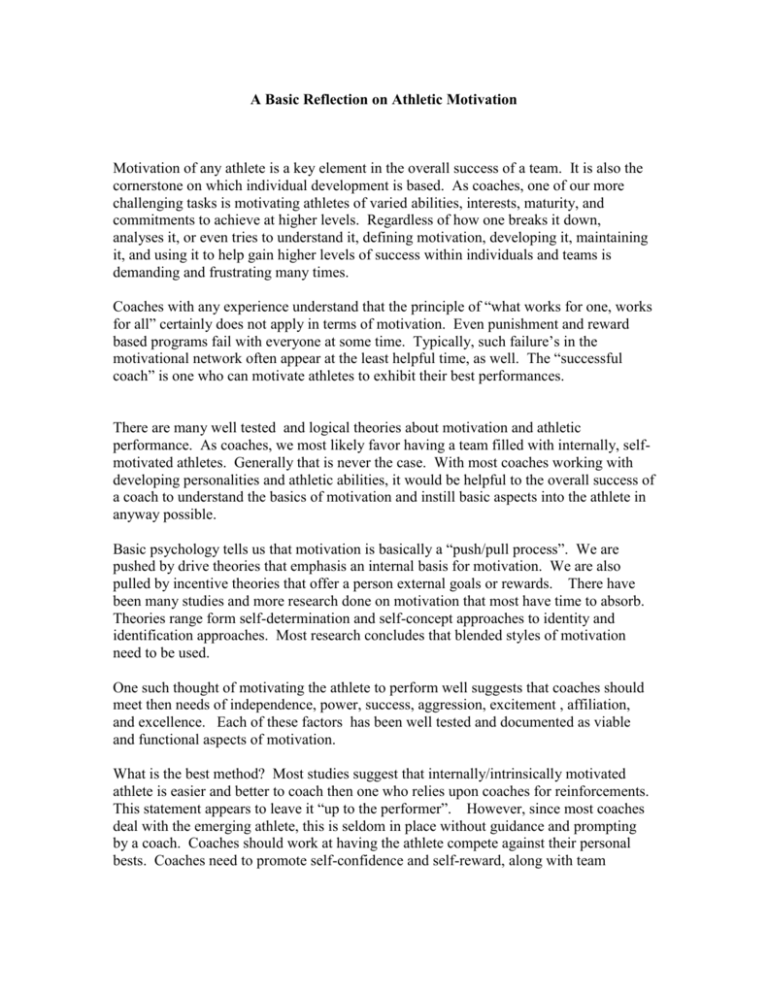A Basic Reflection on Athletic Motivation
advertisement

A Basic Reflection on Athletic Motivation Motivation of any athlete is a key element in the overall success of a team. It is also the cornerstone on which individual development is based. As coaches, one of our more challenging tasks is motivating athletes of varied abilities, interests, maturity, and commitments to achieve at higher levels. Regardless of how one breaks it down, analyses it, or even tries to understand it, defining motivation, developing it, maintaining it, and using it to help gain higher levels of success within individuals and teams is demanding and frustrating many times. Coaches with any experience understand that the principle of “what works for one, works for all” certainly does not apply in terms of motivation. Even punishment and reward based programs fail with everyone at some time. Typically, such failure’s in the motivational network often appear at the least helpful time, as well. The “successful coach” is one who can motivate athletes to exhibit their best performances. There are many well tested and logical theories about motivation and athletic performance. As coaches, we most likely favor having a team filled with internally, selfmotivated athletes. Generally that is never the case. With most coaches working with developing personalities and athletic abilities, it would be helpful to the overall success of a coach to understand the basics of motivation and instill basic aspects into the athlete in anyway possible. Basic psychology tells us that motivation is basically a “push/pull process”. We are pushed by drive theories that emphasis an internal basis for motivation. We are also pulled by incentive theories that offer a person external goals or rewards. There have been many studies and more research done on motivation that most have time to absorb. Theories range form self-determination and self-concept approaches to identity and identification approaches. Most research concludes that blended styles of motivation need to be used. One such thought of motivating the athlete to perform well suggests that coaches should meet then needs of independence, power, success, aggression, excitement , affiliation, and excellence. Each of these factors has been well tested and documented as viable and functional aspects of motivation. What is the best method? Most studies suggest that internally/intrinsically motivated athlete is easier and better to coach then one who relies upon coaches for reinforcements. This statement appears to leave it “up to the performer”. However, since most coaches deal with the emerging athlete, this is seldom in place without guidance and prompting by a coach. Coaches should work at having the athlete compete against their personal bests. Coaches need to promote self-confidence and self-reward, along with team affiliation and social cohesiveness. Emphasis should be more on success of the individual in these domains than merely on victory. This self-motivation always arises form some “inner cause, wish, need, or drive”, and once in place, needs little to no external reason. This type of motivation is vitally important not only in athletics but in all forms of societal endeavor that expects high performance and success. Such athletes learn that they alone are accountable for actions, choices, and decisions. More than likely, in equal situations, the difference between being successful or unsuccessful boils down to internal motivation. It boils down to the ability of the individual athlete to develop strength, desire, determination, and willpower to strive for the goal. If an athlete wants to succeed, the motivation that will drive that outcome has to come from within. As coaches, we need to help nourish this within our athletes. It cannot be random or occasional. It has to be consistent and purposeful. Ralph Waldo Emerson and William James had very great quotes about the nature of human motivation and outcomes of it. Simply put, they believed that a man becomes what his thoughts dwell upon. Thus, the basic law of human/athletic motivation is simply that an athlete becomes what he chooses to think about. The first step is realistic goal-setting. Again, this is something that the emerging personality and athlete needs well grounded guidance to do, otherwise most goals would focus upon being “all-world” or the next Lebron, or Brady, or Sanderson, or whoever the local “star “ is. Goals are about growing to ending places and then setting another. Successful coaches know this and use this. Secondly, a person must commit to attaining their own peak performance. This is a desire and willingness to work toward goal completion. The earlier athletes dedicates themselves to this, the more likely the achievement. Again, solid mentoring and guidance form coaches is vital to helping the young athlete keep solid on the goal. Thirdly, the athlete must develop belief in their ability. Most are not going to be ‘the best”. Statistically, there is only one of those. Athletes must acknowledge and appreciate their talents and their weaknesses. Knowing what you cannot do and knowing what you can do gives talent a perspective. That perspective breeds confidence, which in turn, breeds success. I successful coach helps an athlete develop this understanding and works at improving the confidence. Pay strict attention to self-discipline. Success has a price. As one coach I know emphasizes, “ It gets more lonely as you approach the top”. Athletes must be willing to “pay the price”. Successful coaches know this and model it to their athletes as well. Never be satisfied with your knowledge, performance, or skill. There is always room for improvement. Even those who had a “perfect game/score” need to understand that there is “another game/score coming”. Always strive to improve and work on the details of your goal. Successful coaches help the emerging athlete understand this need to grow, learn, development all the time. Learn from defeat or failure. Most coaches and people who win seemingly easy will tell you that a loss often tells them more about themselves and their team than does winning. Anyone who has never loss or been defeated hasn’t met strong enough opponents yet. Successful coaches help athletes keep perspective on their accomplishments and their failures. They don’t let the athlete live in either for too long. Successful coaches help their athletes keep working to attain the goals they have, not to be terminally defeated by loss or dangerously inflated by victory. Never live with alibis. There is a saying that the best excuse is the one you never make. Successful coaches keep the athlete focused upon what they can handle and control. Healthy self-concept demands that we take ownership for those things we can influence. Successful coaches know one major key to motivation is not letting the athlete dwell in excuse-making or alibi-giving. In the final analysis, there is much more than can be written about coaching and motivation. Each coach and each athlete has their own take and perspective on what it is and how it is instilled and managed. The ultimate outcome of sound motivation is success at many levels and a life-long skill that promotes being successful. It is hard to imagine there being nay other goal in the coaching of emerging athletes and people.



